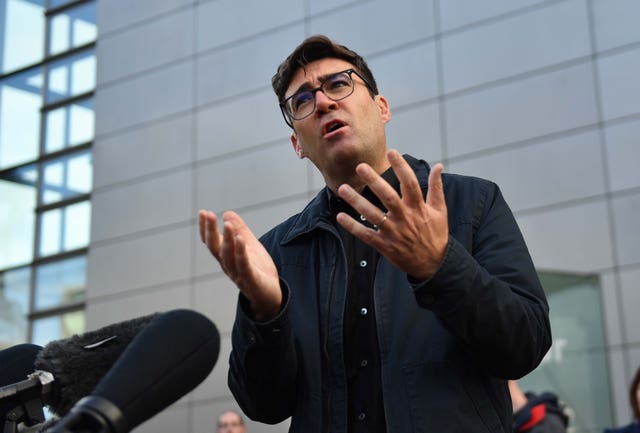Hancock: Greater Manchester row a factor in decision to scrap tier negotiations
The Health Secretary said the wrangle over placing Greater Manchester in Tier 3 had been “bad for public health”.

The Health Secretary said the Government’s wrangle with Greater Manchester over coronavirus restrictions was a factor in changing its approach on how to apply the forthcoming tiers-based system.
Matt Hancock told MPs that the high-profile battle in October with the North West region over moving it into Tier 3 restrictions had been “bad for public health” and vowed not to let it happen again under the new system coming in next month.
Before the second national lockdown in England, ministers undertook negotiations with local authorities in order to settle on a package of measures to control rising rates of coronavirus infection in their areas, along with financial support to help mitigate any impact.
But a lengthy row last month with Greater Manchester saw the region’s mayor Andy Burnham undertake a host of defiant press conferences objecting to plans to put the 10 boroughs into Tier 3 – the most stringent of Covid restrictions.
The Labour mayor accused ministers at the time of treating the region as a “sacrificial lamb” by asking it to accept a proposal which the “Government’s own advisers say won’t work”.
Under beefed-up tiers announced by the Prime Minister on Monday, due to come into force once the lockdown ends on December 2, there will no longer be a set of negotiations with local areas, with ministers instead relying on a formula to decide which areas are placed in what tier.
To make their decision, officials will look at coronavirus cases across all age groups, but specifically among the over-60s who are considered most at risk, along with whether infection rates are rising and the prevalence of the disease per 100,000 of the population.
During a joint session in front of the Health and Social Care Committee and Science and Technology Committee, Mr Hancock said the experience of negotiating with Greater Manchester had spurred on the change.

The Conservative minister said on Tuesday: “The reason we are doing it differently is, whilst in most cases when we negotiated with most areas in the previous tiered arrangement, we had a high quality discussion which led to better outcomes.
“A case in point is Liverpool, where the case rate has fallen by over two thirds in the last three weeks.
“Unfortunately that wasn’t the case in all local areas.”
Asked by Labour MP Graham Stringer whether he was referring to Greater Manchester, Mr Hancock said: “That would be one example but not the only one.
“Sadly, in the case of Greater Manchester, cases carried on going up whilst we were trying to put in place the measures that were necessary.
“So, instead, we’ve proposed a set of measures within the tiers which are fixed, also financial support which is agreed by formula rather than negotiation.
“We will have engagement but what we won’t have is a two-week long negotiation while the cases still go up. That is bad for public health.”
Mr Hancock said engagement was currently underway with local authorities ahead of Thursday’s announcement about what tier each area is set to be in once the lockdown lifts in December.





